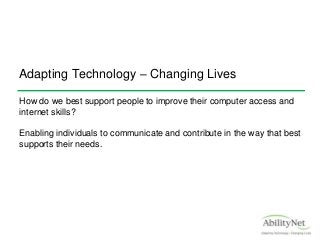
Adapting Technology – Changing Lives - Dianne Cockburn (Abilitynet)
- 1. Adapting Technology – Changing Lives How do we best support people to improve their computer access and internet skills? Enabling individuals to communicate and contribute in the way that best supports their needs.
- 2. Participating at Work Chris – Has rheumatoid arthritis and works in finance • There are 11.8 million Disabled people in the UK – Office National Statistics • 1 in 5 acquire a disability during working age - Health and Safety Executive • Disabled people are as productive as their able bodied colleagues given the right reasonable adjustments - HSE • Disabled People take less sick leave – Are more loyal and stay longer - HSE 2
- 3. Participating in Education Sam – has dyslexia is 19 years old and is preparing to go to University in 2013 • Disabled people are around twice as likely not to hold any qualifications compared to non-disabled people, and around half as likely to hold a degree-level qualification • 20 per cent of working age disabled people do not hold any formal qualification, compared to 7 per cent of working age non-disabled people • 14.5 per cent of working age disabled people hold degree-level qualifications compared to 26.8 per cent of working age non-disabled people 3
- 4. Participating in Education • “There is evidence of a “route to offending” among certain young people, which starts with difficulties in the classroom, moves through low self- esteem, poor behaviour and school exclusion, and ends in offending. Children and young people with dyslexia are more likely fall onto this route, because of the difficulties they face with learning...” An Examination of the Relationship between Dyslexia and Offending in Young People and the Implications for the Training System Jane Kirk and Gavin Reid University of Edinburgh, UK 4
- 5. Participating at Home Maxine – Wanted assistance to acquire IT skills • When disabled people are not in education or employment there is a gap in funding for ICT equipment. PostNote Parliamentary office of Science and Technology – May 2012 • Over 80% of the population as a whole access the internet regularly but this figure drops to 55% for those with disabilities. • In the vast majority of cases technological solutions exist to allow users to get online, so the disparity is not directly caused by any impairment. Instead it is due to existing barriers to take-up such as the cost of equipment, social exclusion and a lack of sufficient training which are often exacerbated by disability PostNote Parliamentary office of Science and Technology – May 2012 5
- 7. Making a Difference • “Both my TV and my computer broke before Christmas. The volunteer found a company to get me a new computer and he set it up for me, just before Christmas. I was so grateful; the internet is my connection to the world.” • “Thanks for the considerable help that the volunteer has given me. He talks in language I can understand (most of the time!) and has given me confidence.” • “I recently had to call your helpline what a great set of volunteers you have. A simple phone call got me in touch with a volunteer. A call from Alan then a home visit and everything was sorted. I am a member of Blind Veterans UK and I cannot thank Alan enough.” 7
